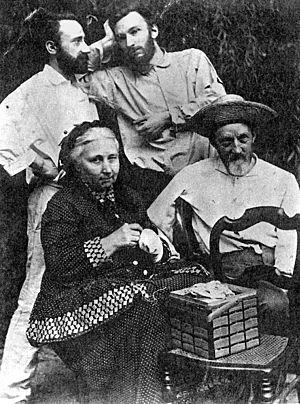Paul-Jacques Curie facts for kids
Paul-Jacques Curie (born October 29, 1855, died February 19, 1941) was a French scientist. He was a physicist and a professor of mineralogy at the University of Montpellier. With his younger brother, Pierre Curie, he studied how certain crystals create electricity when heated. This led them to discover how some materials produce electricity when squeezed. This effect is known as piezoelectricity.
Contents
Life and Career
In 1883, Jacques Curie became a professor of mineralogy at the University of Montpellier. This meant he no longer worked directly with his brother, Pierre. He stayed in Montpellier for most of his life.
From 1887 to 1889, he taught and did research in Algeria. Later, in 1903, he became a professor of physics. He held this important position until he retired in 1925. Jacques Curie's son, Maurice Curie, also became a physicist.
Amazing Discoveries
Jacques Curie's most important discovery was the piezoelectric effect. He made this discovery with his brother Pierre in 1880. At the time, they were working as lab assistants in Paris.
Many people often give Pierre more credit for this discovery. However, it's hard to know exactly who did what. The brothers shared their ideas constantly. Jacques had more experience studying how heat creates electricity in crystals. Experts now believe their discovery was a true team effort.
What is Piezoelectricity?
Imagine squeezing a special crystal. When you squeeze it, it creates a tiny electric charge! This is the piezoelectric effect. It also works the other way around. If you send electricity through the crystal, it will change shape.
This effect is used in many things we use every day. For example, it's in microphones, speakers, and even some lighters.
The Curie–von Schweidler Law
Jacques Curie also helped observe something called the Curie–von Schweidler law. This law describes how certain materials react when you apply a steady electric voltage to them. It helps scientists understand how electricity moves through different substances.
See also
 In Spanish: Jacques Curie para niños
In Spanish: Jacques Curie para niños


